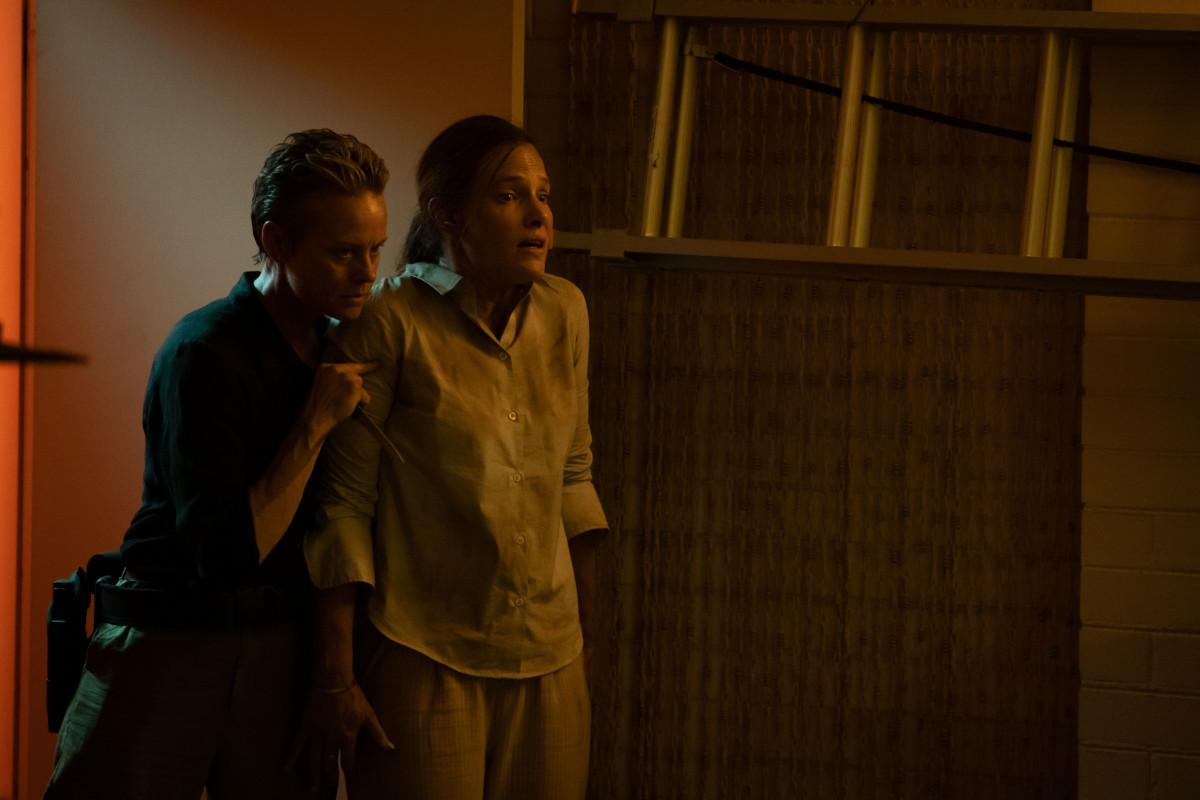
It’s one thing to tell a story of “good versus evil”. It’s another to observe this narrative in a way that brings nuance without negating reality or even common sense. I would imagine this brings challenges to any director or screenwriter, including and especially Scott Major in his striking psychological crime thriller out of Australia, Line Of Fire, as it’s titled for its U.S. release.
There are no two ways about it with this film as the minute it begins, the eeriness sets in for an early morning start for our two leads: Jamie (Samantha Tolj), a married mother of two and freelance gossip blogger struggling to land her next big payday, and Samantha (Nadine Garner), a suburban police officer and single mother bickering lovingly with her son to get ready for school instead of sheepishly playing sick. Immediately, the film makes it clear just how different and far out of the way of each other both characters are, from neighborhoods and occupations to economic classes and personalities, a progression that begins to unfold into a maddening descent into hell when Samantha’s son falls casualty to the double-digit body count left by a school shooter while she was on the scene.
The incident soon makes headlines and reaches Jamie as she’s relaxing by the pool with her husband Greg (Brett Cousins) and their friends. Indeed, it’s bad enough that Samantha is now subject to scrutiny by the public and her peers for failing to act while armed. Nonetheless, it’s Jamie who chooses to leapfrog off the tragedy as an opportunity to step back into the journalistic spotlight for an exclusive – and highly lucrative interview with Samantha to get her side of the story. Never mind that her methods become increasingly, and rather noticeably unscrupulous even to Greg who tries desperately to get Jamie to see the err of her ways just after Jamie’s first awry conversation with an audibly disturbed Samantha.
Push comes to shove, however, as Jamie’s persistence forces an already tormented Samantha toward the brink, commencing what can only be summed up as a night of absolute terror for Jamie when, convinced that Samantha is ready to talk, sets out one late evening for said interview. It isn’t too long before a jaded Jamie walks back into her home to suddenly find her family missing and completely out of sight, save for a series of texts from Samantha showing photos of each of them tied, bound, and trapped in shallow graves. Ripped from the comfort of her career-centric and affluent life, Jamie is thrust into a race against time to save her family while coming to terms with the line she crossed in the wake of a tragedy for which they both now find themselves suffering dire consequences.
Line Of Fire isn’t so cut and dry thanks to a characterization process that invites you into a myriad discussion of topics pertaining to class, policing, mental health and humanity. Joel Schumacher’s Phone Booth and the Michael Douglass-led Falling Down are two very good examples of films that aim toward this kind of storytelling, made even more prevalent and compelling by the addition of a school shooting in which, in Major’s movie, there are about two-dozen students suggested to be the victims of the crime, something to think about in a time where a topical issue like police brutality takes a backseat, riding in the same vehicle with news blurbs dating back as far as last May at the top of one of the biggest trials of public scrutiny seen of the Uvalde Texas police department.
To that effect (and not for nothing either), one of the biggest wins with Line Of Fire is its ability to put a rare face on policing – one that initially invokes pain and compassion, followed by a twisted reveal of history with its own hidden skeletons, per se. That image is instantly tarnished by the horrific depth she’s willing to sink to in order to turn Jamie’s world upside down, including getting other people killed in the process. To give you a solid idea of just how bad these two characters are about to have it for one another, at about thirty five minutes in, Jamie’s PR strategy takes a turn for the worse – from putting out a salacious promo video slamming Samantha out of a petulant need for relevance dressed as pseudo-feminist urgency as women fighting for their careers, to a crisp, gut-punching moment in a series of text messages, one which will grab you by your insides for about thirty seconds before resuming the story.
Major, and screenwriter Christopher Gist make it crystal clear that there are absolutely no heroes in Line Of Fire. Segmented between music breaks and moments of gut-wrenching twists and gruesome violence and coupled with a piercing examination of the human psyche when pushed to the brink, Major’s freshman feature flick is host to one of the strongest dualities on screen by Garner and Tolj, in a chilling, consequential story that dares viewers to see the humanity in others beyond binary filters and clickbait headlines.
